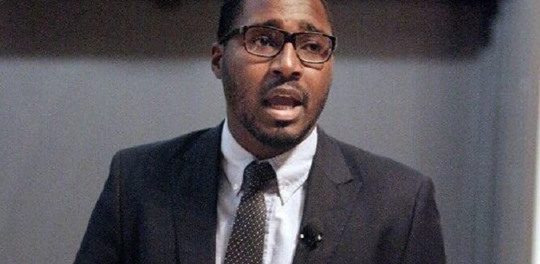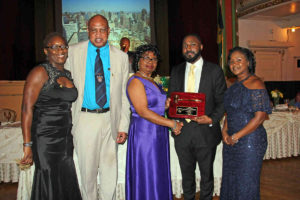Vincentian Harvard Law Review President wants climate change addressed
Get our headlines on WHATSAPP: 1) Save +1 (869) 665-9125 to your contact list. 2) Send a WhatsApp message to that number so we can add you 3) Send your news, photos/videos to times.caribbean@gmail.com

The Vincentian-born president of the Harvard Law Review, Michael Thomas, Jr., wants climate change to be seriously addressed.
In delivering the keynote address Sunday at the gala Independence Anniversary Luncheon, marking St. Vincent and the Grenadines’ 39th Anniversary of Independence, at Grand Prospect Hall in Brooklyn, Thomas said now that he’s on the verge of leaving law school, he’s been spending a lot of time thinking about what comes next.
“People hear that one of the people who came before me as president of the Harvard Law Review was Barack Obama,” he told patrons at the event, organized by the Brooklyn-based Council of St. Vincent and the Grenadines Organizations, U.S.A., Inc. (COSAGO). “You know him as the former president of the United States. And now, because of him, and for much of the country, including Trump, if I ever became president, I would only be the second US President born outside the United States.”
But Thomas said although there are many different kinds of issues that he cares about and all kinds of issues that he would be glad to work on, “the most important thing I can do is to put my head down and take my own chance at changing the world.
“Because the one thing that I’m absolutely convinced of is that yes, we confront a whole range of challenges from deep economic inequality to centuries of racialized violence to the emerging threat of our changing climate,” he said. “All those problems are serious. They are definitely daunting. But they are definitely solvable.”
In taking just one example, Thomas said, as the international community learns more about climate change, “we must come together to face this problem globally.
“This is the greatest challenge my generation faces,” he said. “A massive hurricane, the likes of which we see with increasing frequency, will someday affect St. Vincent and the Grenadines. It is not a question of ‘if,’ but rather ‘when.’
“From our neighbors, we can glean lessons learned the hard way, and build alliances to address the challenge of tomorrow,” he urged, noting that Antigua and Barbuda, an island-chain nation of similar population, lost its second largest island, Barbuda, in one day of Hurricane Irma.
“Ninety five percent of buildings and infrastructure on the island were demolished, and it became uninhabitable in the blink of an eye,” Thomas said. “Though it is a difficult reality to face, we must acknowledge that we could face a situation where one or more of our islands being cleared out by rains, flooding, storm surges and mudslides.”
He also said lessons could also be learned from Trinidad and Tobago, which just recently suffered deadly flooding from what was only a tropical storm.
“One hundred thousand people have been affected, a quantity that would be untenable for an island like St. Vincent (and the Grenadines,” Thomas said. “This tragedy shows that, if infrastructure is not up to the task, even smaller storms can damage us in dreadful ways.”
The law student said that, regardless of how other countries respond to climate crisis, “such a massive effort will require leaders stepping forward.
“If I know anything about the tenacity and ingenuity of Vincentians, it’s that St. Vincent (and the Grenadines) could be a leader in the region, making our nation and the Caribbean at large a sterling example to the world,” he said. “But we’ll have to do it faster than the international airport was built.”
Thomas said the first steps will be identifying the country’s weak points and determining how it can stave off the greatest catastrophe were a hurricane to hit tomorrow.
“A massive storm will be destructive regardless, but what steps can be taken to avoid a tragedy like Trinidad?” he asked. “In truth, this will become a large infrastructure project that would most likely improve the lives of Vincentians, regardless of the weather.”
In building for the future, Thomas said St. Vincent and the Grenadines can take advantage of its volcanic islands and steep altitudes, building at higher elevations to anticipate rising sea levels.
“Such activity will require a great deal of work, which can employ many Vincentians right in their backyards,” he said. “In doing so, we will create a workforce that can export our practical knowledge and experience across the Caribbean.”
In considering the exorbitant price of petrol and other fuels in St. Vincent and the Grenadines and throughout the Caribbean, Thomas proposed one of the green efforts being in solar energy, wind energy and geothermal energy — resources, which he said, “the region has in abundance.”
“We should be moving towards a future in which St. Vincent and the Grenadines is powered cleanly and self-sufficiently,” he said. “We can be the nation that spreads and supplies the technology to our neighbors who face the exact same difficulties.
“Where once our bananas fed the world, our citizens, trained in installation and upkeep of these devices, will become known for popularizing and making practical a futuristic and forward-thinking source of energy,” Thomas added. “We can rely on alliances with our neighbors to coordinate such large-scale endeavors and may be able to coordinate each small nation into a specific task, adding up to a massive scale that produces real results.
“We’re all gathered here to think about the nation’s future. And we all have a role to play in it,” he continued. “The success of our island-nation will depend on whether we can collectively stand up to the challenges we face. And do that as a community. Much of our future depends on it.”


Leave a comment
You must be logged in to post a comment.